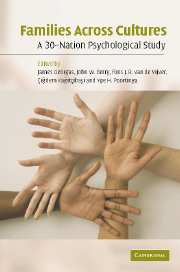Book contents
- Frontmatter
- Contents
- List of figures
- List of tables
- List of contributors
- Acknowledgments
- Prologue
- Part I
- 1 Families and family change
- 2 Cross-cultural theory and methodology
- 3 Theoretical perspectives on family change
- 4 Family portraits from 30 countries: an overview
- 5 Hypotheses
- 6 Methodology of the study
- 7 Results: cross-cultural analyses of the family
- 8 Synthesis: how similar and how different are families across cultures?
- Part II
- Appendix
- References
- Index
5 - Hypotheses
Published online by Cambridge University Press: 10 December 2009
- Frontmatter
- Contents
- List of figures
- List of tables
- List of contributors
- Acknowledgments
- Prologue
- Part I
- 1 Families and family change
- 2 Cross-cultural theory and methodology
- 3 Theoretical perspectives on family change
- 4 Family portraits from 30 countries: an overview
- 5 Hypotheses
- 6 Methodology of the study
- 7 Results: cross-cultural analyses of the family
- 8 Synthesis: how similar and how different are families across cultures?
- Part II
- Appendix
- References
- Index
Summary
This project was guided by several basic questions. How are ecological and sociopolitical features of societies related to the structure and function of families, to family networks, to family roles, and to psychological variables such as emotional bonds, self-construal, personality, family values, and personal values? To what extent are the structure and function of the families in societies throughout the world related to increased economic changes, and how have these changes affected family networks, family roles, personality, and values? To what degree will changes in family structure, function, and psychological relationships characteristic of North America and Northern Europe also occur in the rest of the world, as predicted by modernization and globalization theories?
The frameworks used in this study of family differ from the typical paradigms of sociology and cultural anthropology in their emphasis on psychological aspects of family. The key concepts that characterize this study are culture, social structure, kinship ties, family roles, and a variety of psychological variables. An important issue in cross-cultural psychology is the search for context variables that can aid in the analysis of the relationships among psychological and cultural variables. This project attempts to identify both cross-cultural universals and variations in the relationships among ecological and cultural variables, family roles, kin networks, and psychological variables.
FAMILY DIVERSITY AND FAMILY CHANGE
In the more than two centuries since Comte and Le Play concluded that the French Revolution and urbanization resulted in the breakdown of the traditional stem family in France, the issue of family change has been examined by sociologists, cultural anthropologists, psychologists, psychiatrists, and other social scientists.
- Type
- Chapter
- Information
- Families Across CulturesA 30-Nation Psychological Study, pp. 100 - 110Publisher: Cambridge University PressPrint publication year: 2006

